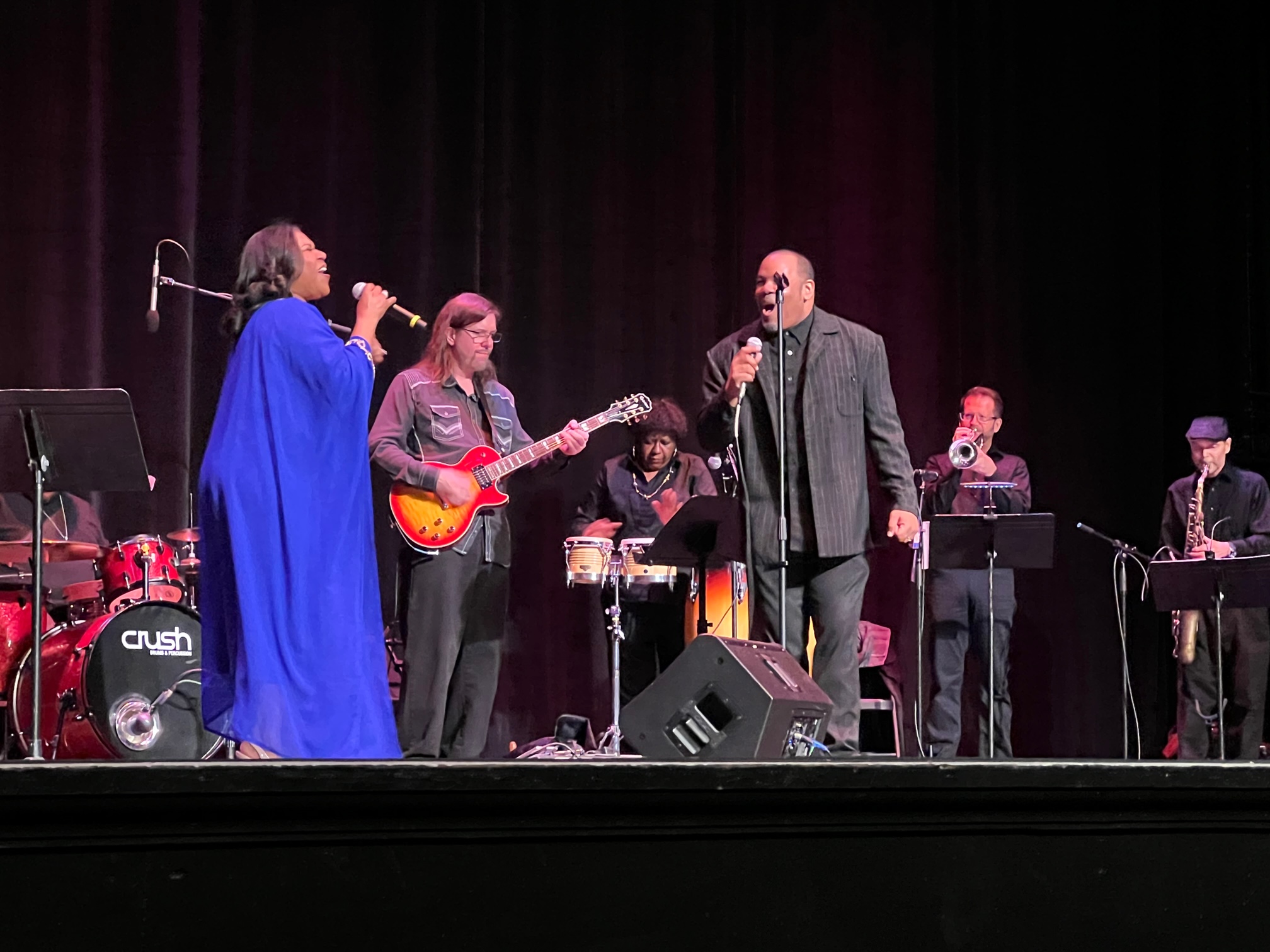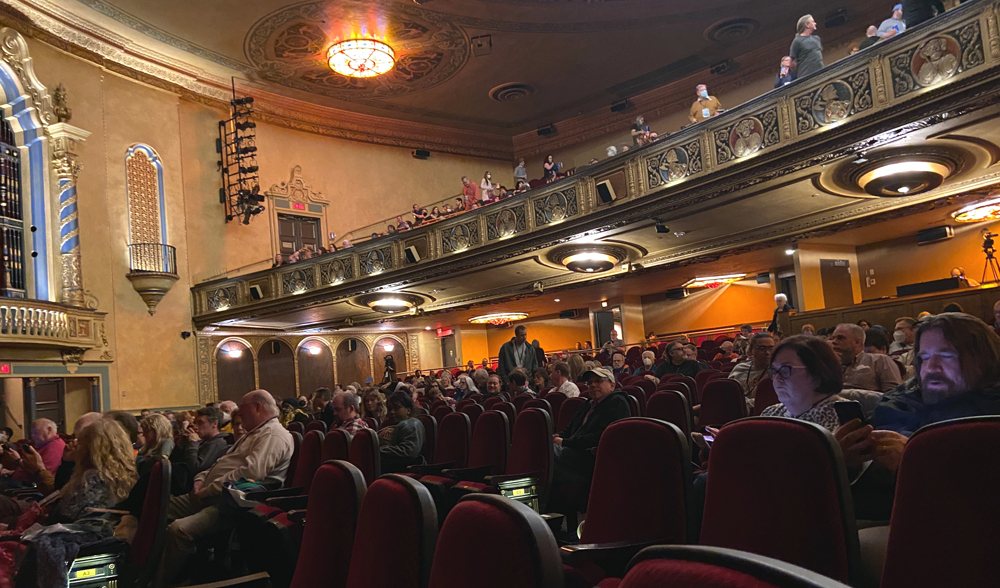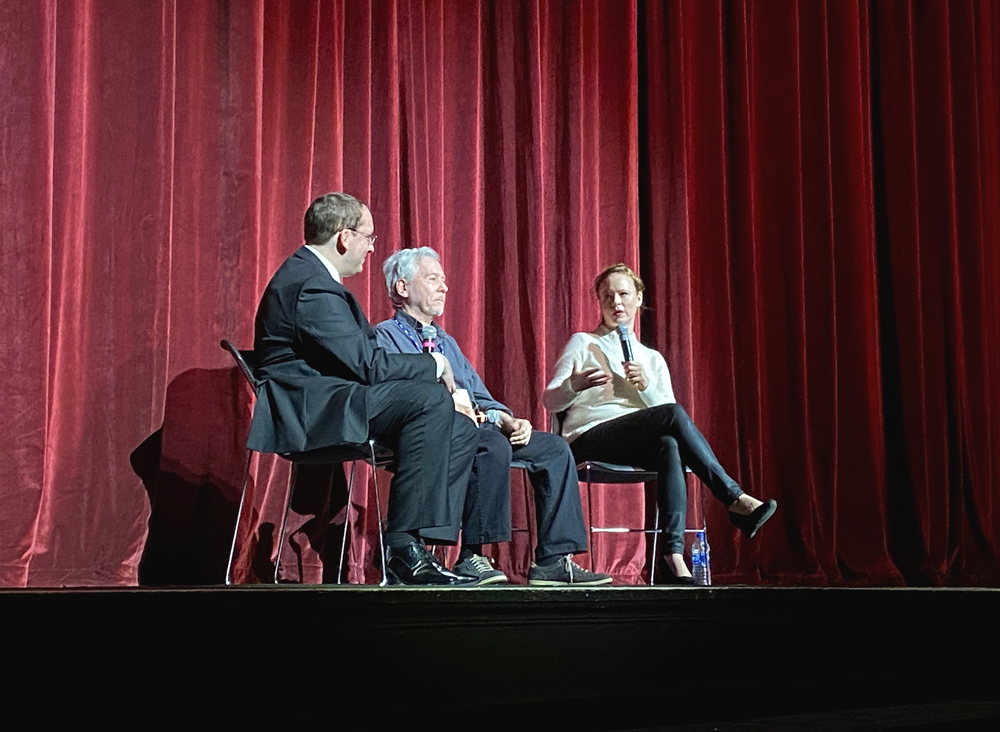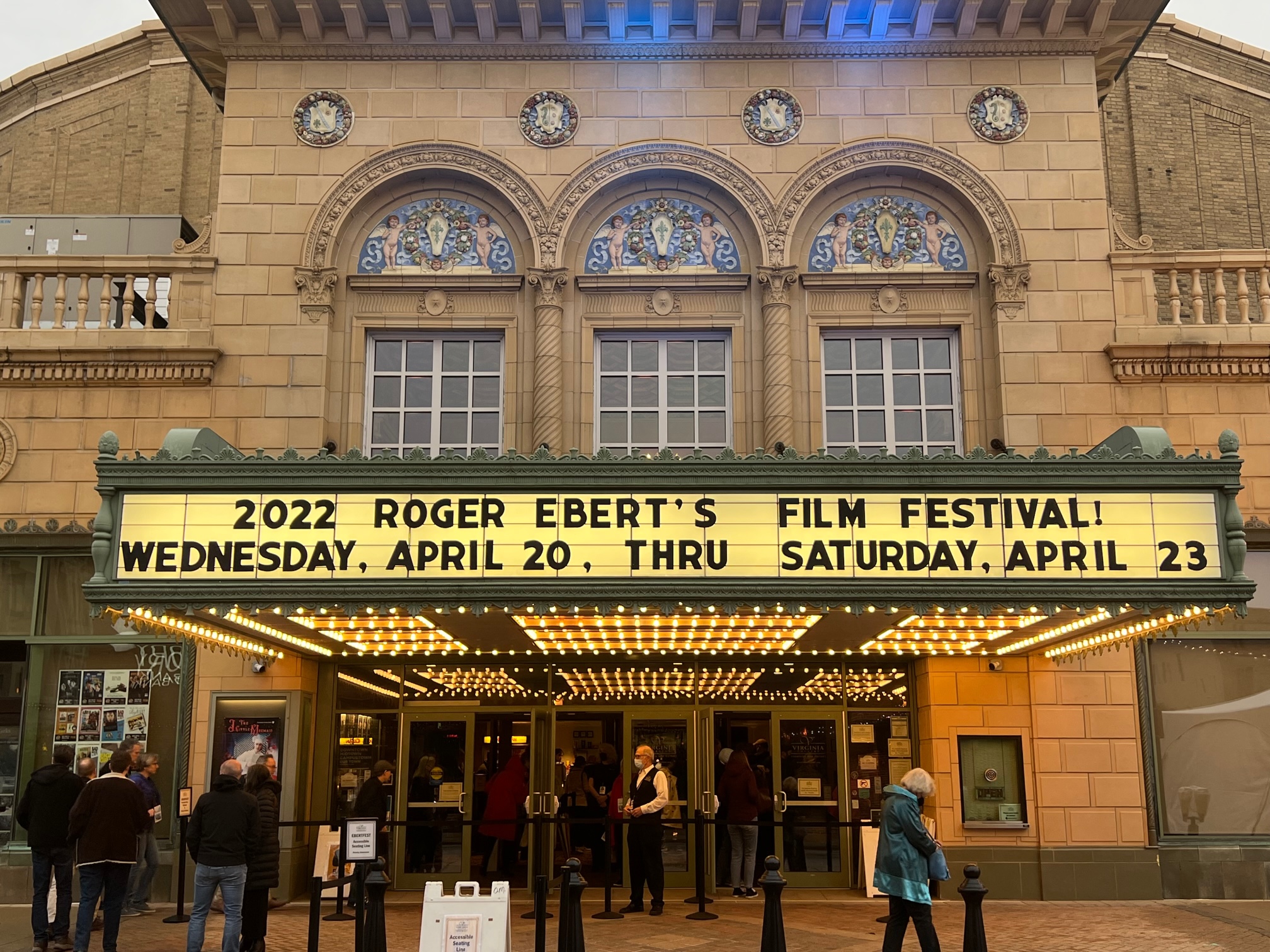It’s taken two years for the 22nd annual Ebertfest to actually happen. Of course it was canceled in April 2020. It was then moved from April 2021 to September 2021. Rising COVID cases pushed the festival one more time, to April 2022. There was definitely a feeling of relief and joy as movie-goers gathered once again at the Virginia Theatre.
Chaz Ebert spoke about the trials and postponements of the last couple of years, praising Nate Kohn and Andy Hall, festival director and assistant director, for their hard work and persistence through all of the pivoting. Then, to open the festival, she brought on Israeli singer-songwriter Clem Snide to perform his song “Roger Ebert”. In it, he speaks of Ebert’s dying words — “It’s all an elaborate hoax” — something he pulled from an interview with Chaz that he’d read in Esquire. It was a sweet tribute to kick off the festival.
This year’s Ebertfest recap features the voices of writers from various sections with one thing in common: a thoughtful passion for film and for the value of revisiting old favorites, and hidden gems, live on the big screen in the company of fellow fans. And this year’s much anticipated program was a true celebration, albeit a bittersweet one, of the art of film, the treasure that is The Virginia Theatre, and, of the ability to gather again before the big screen.
— Julie McClure, Managing Editor, Culture Editor and Debra Domal, Arts Editor
Summer of Soul

Photo by Julie McClure.
Yes, I could’ve watched Summer of Soul on Hulu, in my jammies, snuggled under a blanket on the couch. However, that means I would’ve missed seeing gospel singers Mahalia Jackson and Mavis Staples up close on the big screen, offering the gift of their impassioned and visceral performance of “Take My Hand, Precious Lord” at the Harlem Cultural Festival. It was soul shattering, and a peak moment in the documentary from Ahmir “QuestLove” Thompson, which told the story of the 1969 festival and its place in the cultural zeitgeist. It was the year after the assassination of Dr. Martin Luther King Jr., and while white America was glued to their televisions watching the moon landing, Black people in Harlem were wondering why money was spent to send people to the moon and not to alleviate poverty. The summer of 1969 is often remembered for Woodstock, but the overlooked Harlem Festival was just as pivotal.
The documentary reveals never before seen footage from the festival, which was professionally filmed but never shown, and is mostly a concert film, with interspersed commentary from attendees and performers, as well as some scene setting of that place and time in history. The festival represented a cross section of Black performers and musical styles, from Staples and Jackson’s gospel to Motown’s Glady Knight and the Pips to B.B. King’s blues to Sly and the Family Stone’s psychedelic funk to Fifth Dimension’s pop. The fight for civil rights was shifting from the nonviolence of Dr. King to the revolution-minded Black Panthers (who acted as security for the event). Nina Simone tapped into this with “Are you ready Black people.”
The night concluded with live performances from Chicago jazz singer Tammy McCann, and local band Ther’Up.Y, featuring vocals from Noah Brown. They continued the themes of the film, weaving together Motown, R&B, and gospel songs. Brown’s voice is extraordinary, and his duet of “Oh Happy Day” with McCann took everyone to church, whether you wanted to go or not. You can see Ther’Up.Y as the house band at Soul on Sunday.
If you missed the Ebertfest showing, a home viewing is in order. This is a concert, filled with some songs that you’ll sing along with and others you’ll just let wash over you, but it’s also a history lesson. (JM)
Phantom of the Open
Michael Barker is the co-president of Sony Picture Classics (159 Academy Award nominations and 36 wins under his watch according to the Ebertfest website) and he’s a friend of the Eberts who has attended the festival for many years. When Barker introduced Phantom of the Open, he told the story of how a phone call with Chaz about an empty slot at this year’s Ebertfest suddenly became a “pre-release preview screening” of a new British golf comedy that hasn’t opened yet in the U.S. So on a lark, Champaign-Urbana film goers got to see one of the most charming comedies in recent years — a true story about an incompetent golfer named Maurice Flitcroft. In his introduction, Barker told us that everything you are about to see on screen “really happened.” Those words made all the difference as my jaw dropped at least one inch more as scene after scene of ridiculous British “nincompoopery” was displayed in front of me in glorious widescreen.
Once again we have living proof that reality is so much better than fiction — even the most creative writer can not make stuff like this up. As proof, the filmmakers showed us video footage of the real Maurice Flitcroft and his hijinks as recorded in the 1970s right before the end credits. As a result, the audience was moved to tears (and spontaneous applause) as the end credits rolled. In the talk-back after the screening, Barker admitted that this was the first time he has seen this film with a live audience and for the first time, he too was moved to tears. This is the power of collective movie watching.
What’s really special about Phantom of the Open is the fact that the filmmakers deliberately avoided all irony in the telling of this story. Their straight-on sincerity was such a breath of fresh air in today’s world of layered meta references. It doesn’t matter that this is movie will surely become a sleeper hit, it doesn’t matter that this movie just premiered in London to really good reviews, and it’s not even important that the protagonist is played by Mark Rylance who won an Oscar for his portrayal of Rudolf Abel in Steven Spielberg’s Bridge of Spies (2015). What really matters is that you see this movie in a theater after it opens in the U.S. on June 3rd — don’t wait to stream it later; trust me, it won’t have the same impact. (PY)
Gilbert
Chaz Ebert introduced the film, saying how Roger Ebert didn’t want to see a movie with only good stuff; he wanted to see the whole thing. Gilbert, Neil Berkeley’s 2017 documentary of Gilbert Gottfried, revealed more about the person behind the screechy standup. Exploring his career and his very private life, the film showed Gottfried in his NYC apartment and on tour. Between intimate footage of both, Berkeley wove older clips of Gottfried’s standup, past TV show appearances, animation of birds he voiced, interviews with other comedians, and Gottfried home videos.
Filmed with no crew, only the camera and director, the film captured Gottfried’s everyday life in the minutiae of ironing a shirt, packing his kids’ lunches, hugging his wife, and waiting with his sister at a bus stop. The film glimpses at his unorganized packing, his obsession with free hotel toiletries, and his commitment to selling merch after shows. The sweet moments of his kids climbing on him and hugging him before school were captivating: How is this the same Gottfried? The film took uncomfortable turns — watching Gottfried wash underwear in the hotel sink, and spontaneously taking photos with Nazis. Not to mention the incredibly specific incenstual joke from 2001 that set his vulgar career.
So much of Gilbert was a stark juxtaposition: the comedian quietly sitting backstage in a storage room and moments later, boisterously telling jokes onstage. Berkeley’s handheld camera close ups of Gottfried’s private life were a timely contrast to the pixelated old footage of his heydays. The cacophony of his explicit standup spliced with tender moments only further punctuated the confusion even Gottfried felt about his life: “It doesn’t seem real to me.”
Through montage, the film showed more shows, more travel, more podcasts, more free hotel stuff, the same routine, the same schtick, for the public. For his family and viewers of this film, there was more to the comedian. Gilbert ended with the comedian’s laugh, especially poignant after his recent passing. After the film, Gottfried’s wife Dara joined the panel via video for the Q&A session. Her bright smile and raw grief was evident on the big screen as she told the audience, “It doesn’t feel real. It feels like he’s going to walk in the door any second.” (AB)

Photo by Jessica Hammie.
Golden Arm
Starring Mary Holland and Betsy Sodaro, Golden Arm was a film about two best friends who try to win an arm-wrestling competition. The comedy follows Danny (Sodaro) as she convinces and coaches her bestie Mel (Holland) to leave her bakery to take Danny’s spot in a big arm-wrestling competition. In the funny and sometimes raunchy film, the kick ass leads are just as funny as they are sweet. Leaving her bakery, Mel works with Danny to get ready to arm-wrestle. The movie had a great sports movie vibe, and the montages did not disappoint. There were detailed close-ups of the arm-wrestlers’ grip, and epic battles of masked opponents.
The leads weren’t the only women in the film; Golden Arm was directed by Maureen Bharoocha, written by Ann Marie Allison and Jenna Milly, and full of talented women playing the villain, the villain’s sidekicks, the paramedic, even a majority of background characters. The film also featured a cameo by legendary arm-wrestler Dot-Marie Jones who has over 600 real life wins.
The big competition at the end of the movie, of course, has a snag, but the twist was so original. The gore and the violence was intense but never too much. The pacing of the movie was snappy, and the run time was only 1 hour and 31 minutes. Golden Arm was a feel-good comedy about women doing something fun, and it was hilarious.
Written by two real life best friends, the writers attended the screening and participated in a discussion afterward. Led by Chaz Ebert, the all-woman panel talked about the film process. The movie was shot in only 20 days, and improv was an integral part of the collaborative film. The writers shared that they like to write about powerful women who aren’t afraid to make fun of themselves. In reference to Golden Arm, the writers said they were “not writing jokes; we were writing a story.” I thought the flick was awesome, and when the film finished on Friday afternoon, the theater was full of applause. (AB)
Ghost World

Photo by Jessica Hammie.
Friday night’s film was the dramedy Ghost World (2001), directed by Terry Zwigoff, starring Thora Birch, Scarlett Johansson, and Steve Buscemi. The film, based on the Daniel Clowes graphic novel of the same name, follows cynical recent high school grad Enid (Birch) as she navigates her relationship with her bestie Rebecca (Johansson) and a 40ish curiosity/love interest Seymour (Buscemi).
Ghost World explores the timeless questions of maturity and the painful, awkward, and potentially beautiful ways young people learn to express their wants and desires and begin that process of growing up. The film does a wonderful job of showing the ways that Enid and Rebecca drift apart (often an inevitability among young people), but will always be tethered to each other — after all, they have a shared trauma of experiencing high school as social outsiders. The relationship between Enid and Seymour is more…disturbing, if not a little sad. It exemplifies the way loneliness can be consuming, so when you find someone you feel connected with, it can be just as consuming as loneliness. If you haven’t seen the film, it’s worth a watch. (Note: There are a few things that don’t hold up: the use of the R-word, a weird and not funny joke about a white character “acting” Black, and those late 1990s eyebrows.)
The screening was the last one of the day, and the audience was near capacity and audibly excited for the movie and panel with Zwigoff and Birch. To begin, Chaz Ebert introduced Zwigoff and Birch, noting that Zwigoff had a special surprise before the film. The surprise was a snippet of his visit to Gilbert Gottfried’s podcast last December. Gottfried found a “neo-Nazi” review of Ghost World on the internet, and wanted to read it to Zwigoff. What followed was a hilarious, borderline hysterical fit of laughter intermixed with a reading of the batshit crazy hateful review. It was a nice (and funny) way to honor the recently deceased Gottfried. You can listen to the entire episode here (skip ahead to 45:30 for the reading of the review; CW: lots of racial and ethnic slurs).
The Q&A panel after the film was fun; both Zwigoff and Birch were generous and engaged, despite the late hour. They both shared some funny stories about the making of the movie, with Birch noting that she felt very connected to Enid and needed about a year after the filming to really settle into herself again. Zwigoff told the audience that the funny post-credit scene involving Buscemi’s character Seymour was conceived and directed by Buscemi; Zwigoff loved it so much he put it at the end of the credits. So if you watch the film, be sure to watch until the very, very end for that little treat. (JH)
Nightmare Alley
In a Zoom call with Chaz Ebert, Guillermo del Toro introduced his 2021 psychological thriller Nightmare Alley with a testament to the timelessness of the story, originally published as a novel in 1946: “[The film] is not about a long time ago, but right now. It’s about lies, truth, and how to con — both yourself and others.” Rather than examining human nature through the lens of science fiction (The Shape of Water) or the supernatural (Pan’s Labyrinth, Crimson Peak), Nightmare Alley is a grounded depiction of the destructive power of greed and pride, how the ugly potential for both exists within us all, and how they can consume us.
The film opens in 1939, with drifter Stan Carlisle (Bradley Cooper) attending a geek show, an act in which a man bites the head off a live chicken. Carnival operator Clem (Willem Dafoe) offers Stan a job, and he begins working with the mystic act Madame Zeena (Toni Collette) and her husband Pete (David Stratham), learning the techniques of coded language and cold reading in order to appear psychic. They warn Stan against using these tricks to pretend to be a genuine spiritual medium, citing the dangerous consequences of believing one’s own lies, even as he finds himself tempted to strike out on his own with fellow performer Molly (Rooney Mara). Will Stan’s dreams of making it big come to fruition, or will his ambition lead him to fly too close to the sun?
The film’s early visual of a man bloodily chewing off a squawking chicken’s head is disturbing enough, but a more psychological horror comes from a scene of Clem explaining to a curious Stan how to get a geek: hook a homeless alcoholic with the promise of a temporary job until another geek is found, reel them in with opium-laced alcohol, and threaten to walk away. “Then, you throw him the chicken,” Clem grins, “he’ll geek.” Although Clem is absent from the film’s second half, his willingness to use whatever manipulation is necessary to achieve his goals is taken to heart by Stan, and a callback to his chilling monologue in the film’s final minutes filled the theatre with mirthless laughter. Maybe the world itself is cruel, but as Nightmare Alley shows in visceral detail, people can be far crueler. The full color version of Nightmare Alley is available on Hulu and HBO Max. (WK)
This article was written by Alyssa Buckley, Debra Domal, Jessica Hammie, Will Kanter, Julie McClure, and Paul Young.








